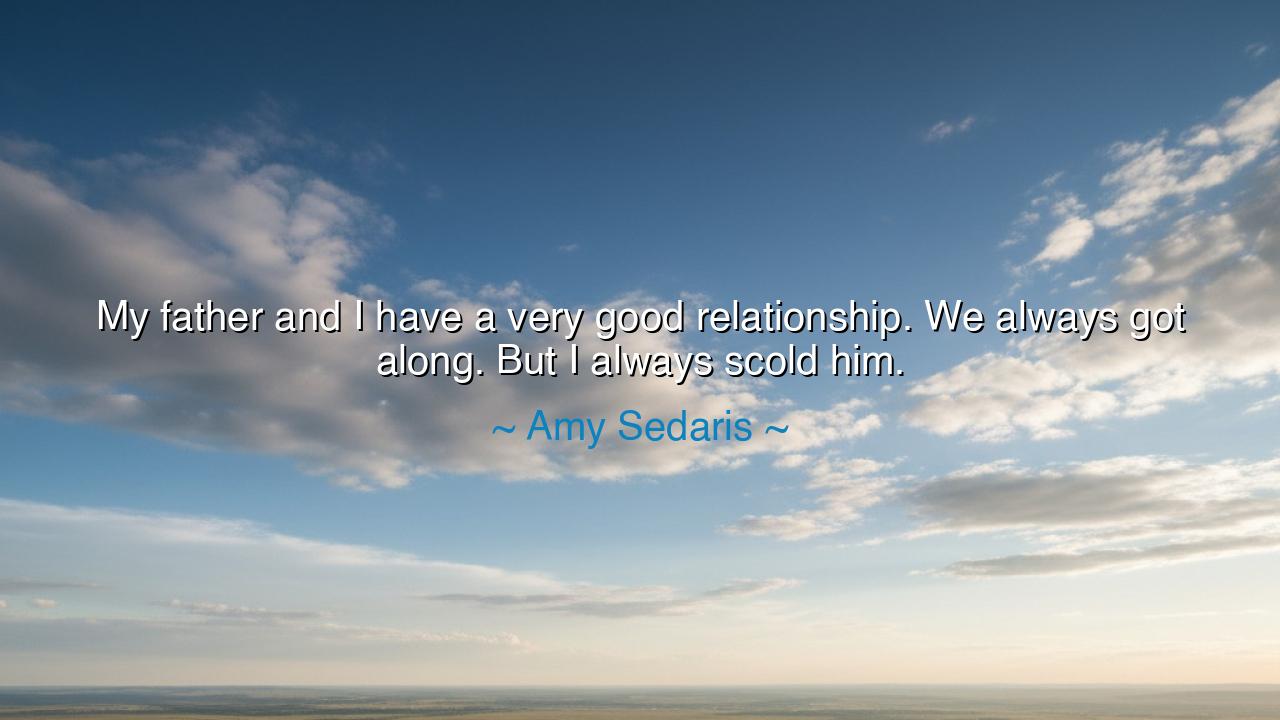
My father and I have a very good relationship. We always got
My father and I have a very good relationship. We always got along. But I always scold him.






The words of Amy Sedaris—“My father and I have a very good relationship. We always got along. But I always scold him”—at first seem lighthearted, almost playful. Yet beneath their humor lies a deep and tender truth about the reversal of love between parent and child, the gentle turning of the years when the roles of care begin to shift. Her tone is mischievous, but her meaning profound. It is the sound of affection seasoned by time—the laughter that hides both gratitude and grief. For in those few words, Sedaris captures the paradox of family: that love often expresses itself not through solemn reverence, but through the small, familiar rituals of teasing, correction, and care.
In the ancient understanding of family, the bond between father and child was sacred, forged not only in authority but in reciprocity. The father was once the teacher and guide; yet in the fullness of life, the child, grown wise through the father’s lessons, becomes the caretaker in return. Sedaris’s “scolding” is not rebellion, but an act of affection disguised as admonishment. It is the child’s way of returning love in the only language the father taught—through guidance, through concern, through words that protect rather than wound. When she says she scolds him, she means she watches over him, as once he did for her. The circle has closed, and love, having matured, now moves both ways.
Amy Sedaris, known for her wit and comic spirit, often speaks of her father with deep fondness. Her humor, as always, conceals the wisdom of empathy. To joke about “scolding” a parent is to reveal the intimacy of that bond—the freedom to speak openly, to chide without malice, to love without restraint. There is no bitterness in her words, only warmth—the kind that can only exist between two souls bound not by duty, but by understanding. For only those who love deeply can afford to tease gently. The scolding, then, is the laughter of care: the echo of concern in the voice of affection.
The ancients might have seen in this relationship the reflection of Odysseus and Telemachus, reunited after long years apart. The son, once a boy who idolized his father, meets him as a man, capable now of judgment, advice, and even gentle correction. Their bond is not broken by time, but refined by it. Telemachus no longer kneels before his father; he stands beside him. In this way, Sedaris’s words are the voice of every grown child who has learned that love matures not into worship, but into companionship. The scolding of a parent, when born of affection, is the child’s declaration: “I am strong enough now to care for you as you once cared for me.”
There is something deeply human, even heroic, in this quiet evolution of roles. For to love one’s parent in age is to mirror the virtue of gratitude. The ancients called this filial piety—not blind obedience, but reverence expressed through kindness and responsibility. To scold a father lightly is to guard him from harm; to laugh with him is to remind him that he is not alone. Sedaris, in her humor, reminds us that family is not a static structure but a living organism—it grows, bends, and sometimes reverses itself, yet remains rooted in affection.
This truth can be seen in the story of Ruth and Naomi, where the younger woman becomes the caretaker of the elder, her loyalty transcending duty. When Ruth declares, “Where you go, I will go,” she speaks the same language of love that Sedaris jokes about—the language of devotion hidden beneath everyday words. It is the gentle scolding that says, “Be careful.” It is the affectionate insistence that says, “You matter to me.” Such gestures, though small, hold the power of sacred vows.
So, dear listener, take this lesson to heart: that love changes form, but never essence. The way we speak to those we love may shift with time—from obedience to guidance, from listening to advising—but the current beneath it remains the same. If you find yourself “scolding” a parent, do so with gentleness; let your care be wrapped in laughter. And if you are the parent being scolded, receive it with grace—for it is proof that your love has come full circle, and that your lessons live on in the heart of your child.
Thus, the wisdom of Amy Sedaris, though wrapped in humor, carries the dignity of an ancient truth: that affection, when true, does not weaken with time—it adapts. The laughter between generations is the song of life continuing, of love reborn in new voices. So cherish those moments of playful correction and shared laughter, for they are the signs that love has matured into its purest form—a companionship that endures beyond age, beyond roles, and beyond time itself.






AAdministratorAdministrator
Welcome, honored guests. Please leave a comment, we will respond soon